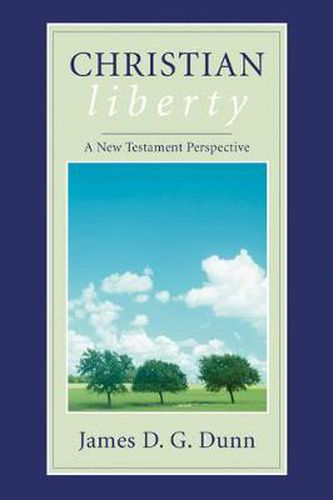Readings Newsletter
Become a Readings Member to make your shopping experience even easier.
Sign in or sign up for free!
You’re not far away from qualifying for FREE standard shipping within Australia
You’ve qualified for FREE standard shipping within Australia
The cart is loading…






Taking the New Testament as the charter of Christian liberty, distinguished biblical scholar James D.G. Dunn approaches the complex subject of freedom from the perspective of Scripture in order to demonstrate what is distinctively ‘Christian’ liberty. After opening with an overview of the historical development of the concept of liberty, Dunn goes on to examine three scriptural test cases that help to elucidate the (often tense) relationship (1) between freedom and authority, as revealed in the responses of Jesus to the dominant conventions of his day, (2) between liberty and the self, derived from Paul’s teaching about sin, death, and the law, and (3) between liberty and society, illustrated by a masterly exposition of Romans 14-15. In a day when the forces of fundamentalism are gathering strength once again on all sides, the theme of liberty, and not least ‘Christian’ liberty, is one that demands attention. This study shows that the freedom of Jesus is something no Christian need fear, that liberty is not a threat to faith but one of its prime expressions.
$9.00 standard shipping within Australia
FREE standard shipping within Australia for orders over $100.00
Express & International shipping calculated at checkout
Taking the New Testament as the charter of Christian liberty, distinguished biblical scholar James D.G. Dunn approaches the complex subject of freedom from the perspective of Scripture in order to demonstrate what is distinctively ‘Christian’ liberty. After opening with an overview of the historical development of the concept of liberty, Dunn goes on to examine three scriptural test cases that help to elucidate the (often tense) relationship (1) between freedom and authority, as revealed in the responses of Jesus to the dominant conventions of his day, (2) between liberty and the self, derived from Paul’s teaching about sin, death, and the law, and (3) between liberty and society, illustrated by a masterly exposition of Romans 14-15. In a day when the forces of fundamentalism are gathering strength once again on all sides, the theme of liberty, and not least ‘Christian’ liberty, is one that demands attention. This study shows that the freedom of Jesus is something no Christian need fear, that liberty is not a threat to faith but one of its prime expressions.